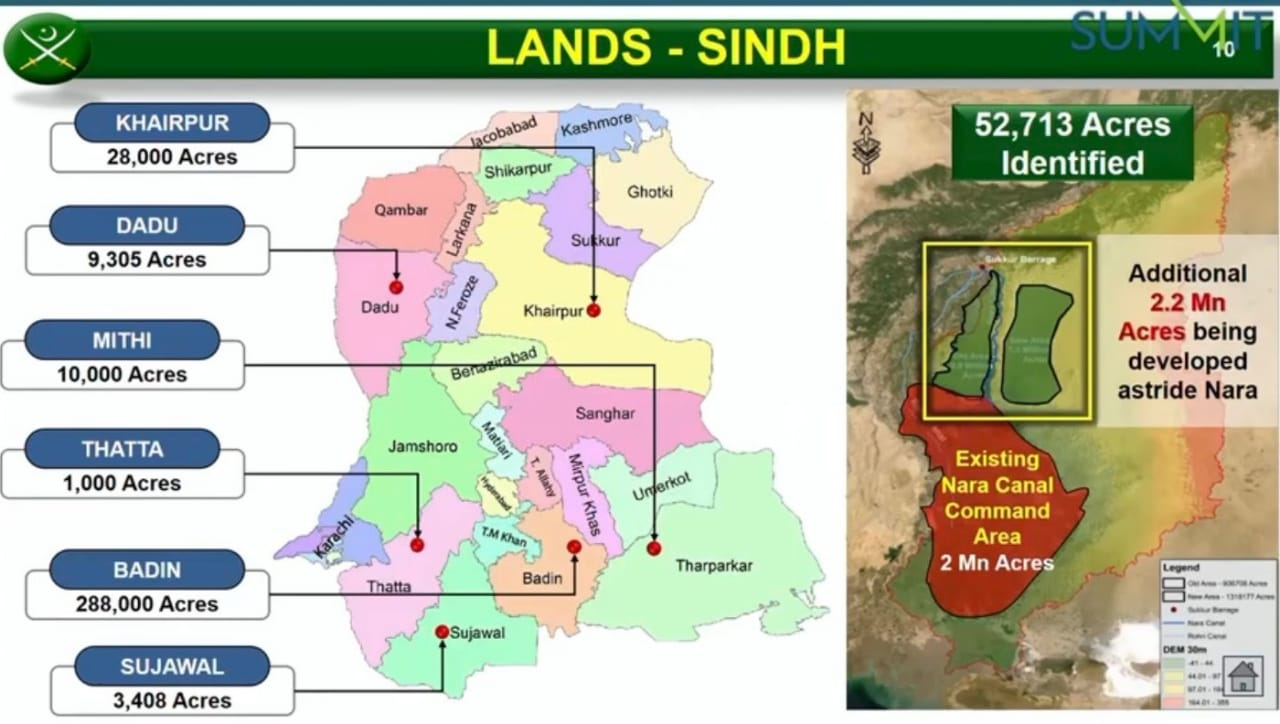
On 29 December 2023, General Asim Munir, Pakistan’s Army Chief was invited to address the National Agricultural Convention in Islamabad. It may be difficult to imagine a uniformed general imparting wisdom to the agricultural scientific community, but Pakistan is an exception. The Army is always at the centre stage of everything that happens in the country.
To his credit, the General did not disappoint the willing audience and reiterated the commitment of the army to support the country’s struggling agriculture sector.
Towards corporate farming
Pakistan is often dubbed as an agrarian economy as agriculture contributes approximately 23 percent to Pakistan’s GDP and employs over 37 percent of its population workforce. However, due to factors such as an acute water crisis, decreasing cultivation area and sub par land productivity, the agricultural imports of Pakistan have risen steeply and now amount to over US$10 billion. As per the recent statistics of the World Food Programme (WFP), almost 37 percent of Pakistanis are still food insecure. These adverse conditions were aggravated by the devastating floods of 2022 and consequently, the agriculture sector considered the backbone of the national economy is requires serious reforms.
Pakistan is often dubbed as an agrarian economy as agriculture contributes approximately 23 percent to Pakistan’s GDP and employs over 37 percent of its population workforce.
Pakistan, where the countryside was once marked by extensive green fields, now faces a grim reality of acute land stress accentuated by population explosion, climate change and power-hungry real estate mafia.
Against this bleak economic backdrop, the Pakistan Army has seized the opportunity and emerged as a driving force for the launch of the “Green Pakistan Initiative”, through which the government aims to enhance agriculture production and reduce food insecurity. Under this scheme, it is planned that farmers will be provided with better facilities including easy provision of loans and adoption of best practices.
COAS Genneral Asim Munir has repeatedly reiterated the Army’s commitment to the Green Pakistan Initiative (GPI). Towards this, the Pakistan Army has developed the Land Information and Management System (LIMS) to modernise Pakistan’s agriculture sector by reclaiming uncultivated and barren land across the country. An officer of the rank of major general has been given charge of the LIMS and appointed as Director General of Strategic Projects (DGSP) to coordinate the planned government initiatives nationwide.
The newly established system also aims to provide real-time guidance to the farmer community regarding weather conditions, irrigation techniques, crop yields, and use of modern technologies.
One of the stated objectives of the Army is to revive the economy by reclaiming uncultivated wasteland to boost socio-economic development in Pakistan. It has proposed to build a new network of irrigation canals to reclaim over nine million hectares of uncultivated wasteland.
One of the stated objectives of the Army is to revive the economy by reclaiming uncultivated wasteland to boost socio-economic development in Pakistan.
COAS General Asim Munir has shown an unusual personal interest in this venture andhas repeatedly assured all the stakeholders that the Green Pakistan initiative will receive complete support from the General Headquarters (GHQ).
“Corporate Farming” is thus the new buzz word and the Army has even created new agro subsidiaries such as FonGrow, under the aegis of its Fauji Foundation. In July 2023,it also inaugurated a “State of the Art Corporate Agriculture Park” spread over 2,250 acres in Pirowal in Punjab.
Similar plans for ushering agricultural prosperity have been made for the barren Cholistan desert where the use of modern technology for sustainable farming and establishment of agri-malls for agricultural commerce is on the anvil.
After much public criticism, the Sindh government has also agreed with M/s Green Corporate Initiative Pvt Ltd—another company formed under the umbrella of the Pakistan Army— and decided to allot the firm with approximately 52,000 acres of land spread across six districts for corporate farming. The 52,713 acres of “barren” land include 28,000 acres in Khairpur, 10,000 acres in Tharparkar, 9,305 acres in Dadu, 1,000 acres in Thatta, 3,408 acres in Sujawal and 1,000 acres in Badin. This vast tract of land will be handed over to the GHQ-owned firm for the next 20 years to execute its ‘Green Pakistan Initiative’.
Image 1: Proposed allocation of land to Pakistan Army by Sindh Government

Source: Journalist Miraj Habib’s X/Twitter handle
Another lease agreement has been signed by the provincial government in Khyber Pakhtunkhwa province which gives the Army ownership rights to cultivate over 17,000 hectares of land in South Waziristan. Peshawa- based XI Corps has already commenced farming on 1,000 acres of land in the Zarmalam area of South Waziristan and plans to expand the farming area to approximately 41,000 acres over the next few years.
In March 2022, GHQ‘s land directorate “requested” the Punjab Government for 45,267 acres of land for corporate farming in districts of Bhakkar(42,724 acres), Khushab (1,818 acres), and Sahiwal(725 acres). This proposal for transfer of land was in fact considered as only the first part of an overall request for over 10 lakh acres of government land in future.
Whose land is it anyway?
The flurry of land-related proposals from the Army has raised many concerns among people of Pakistan. For instance, in Village Chak No.20/ML in Bhakkar district, more than two hundred people signed a legal petition protesting the proposed land transfer. Lahore High Court also questioned the constitutionality of the Army’s demand and issued a stay order which prevented the Punjab government from transferring land to the military. However, eventually, the high court order was unsurprisingly suspended and the government has now gone ahead with its plan for corporate farming by the Army.
However, the military’s obsession with land is not entirely new. For many decades, Okara Military Farms in Punjab Province have been a subject of much public debate in Pakistan. Spreading over 17,000 acres, these farms which were part of the canal colonies developed by the British in the latter half of the 19thcentury have become a reason for bitter dispute between the Pakistan Army and the farmers, after the Army took ownership of the land and stipulated that the cultivators will have to give them a share of the revenue generated by crops grown on it. There have been frequent allegations of excesses by the Army authorities such as in July 2014 when two farmers were killed and six people were injured due to the clashes between the farmers and the Army over the extension of the land contract.
The military’s obsession with land is not entirely new. For many decades, Okara Military Farms in Punjab Province have been a subject of much public debate in Pakistan.
This has not, however, dissuaded the military leadership and the current dire economic situation of the country gives them another opportunity to intrude into the realm of land management.
On its part, the Army has justified its involvement by stating that the Green Pakistan Initiative is in its domain because food security including climate change and prevention of famines is also part of the larger ambit of national security.
Prognosis
Ever since its birth, Pakistan’s polity has been characterised by the disproportionate role played by the military in decision-making. Over the years, besides political meddling, the armed forces have also developed significant corporate interests through over 50 commercial entities, ranging from cereals to cement production and housing colonies. The newly created Special Investment Facilitation Council (SIFC) has further institutionalised the clout of GHQ in Pakistan’s economic landscape.
Pakistan Army’s foray into the agricultural fields has also raised discomforting questions over the impact of such a venture on its combat edge. Although GHQ is unlikely to employ active soldiers for farming, issues such as the lucrative opportunities of land ownership, post-retirement opportunities in its proxy commercial entities and the increasing angst in civil society are bound to have a long-term negative impact on Pakistan’s Armed Forces.
The newly created Special Investment Facilitation Council (SIFC) has further institutionalised the clout of GHQ in Pakistan’s economic landscape.
The military's economic stakes pursued through a vast business empire have grown manifold over the last few decades. The government during a recent debate in the National Assembly presented official data which revealed that the Pakistan Army runs business entities worth approximately US$40 billion and is by far the largest business house of the impoverished nation. The Pakistan Military owns more than 50 business enterprises, industrial units shopping complexes and housing colonies, etc. which are run by its front conglomerate companies such as the Fauji Foundation, Shaheen Foundation, Bahria Foundation, Army Welfare Trust (AWT) and Defence Housing Authorities (DHAs).
The Army’s agricultural ambitions, therefore, are a natural progression as it seeks to maximise its fortunes and further consolidate its vast business empire. In the long run, this financial obsession could turn out to be costly, both for Pakistan and for its military.
Brig Sushil Tanwar, VSM, is an alumnus of Military School (Ajmer) and National Defence Academy..
The views expressed above belong to the author(s). ORF research and analyses now available on Telegram! Click here to access our curated content — blogs, longforms and interviews.





 PREV
PREV


